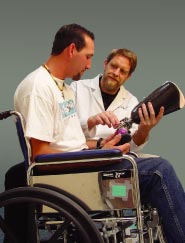
Rehabilitation
Medicine | Prosthetics & Orthotics
Rehabilitation Technologists
| Rehabilitation Psychologists
Speech-Language Pathologists and Audiologists
Physicians who specialize
in rehabilitation medicine are called Physiatrists (fizz-ee-at'-trists).
Physiatrists provide rehabilitation medical care to people whose physical
function capacity is limited by the consequences of injury, disease, or
congenital disorder. Physiatrists team with other physicians and rehabilitation
professionals such as nurses, physical therapists, occupational therapists,
psychologists, prosthetists and orthotists to provide the interdisciplinary
care needed to increase the functional abilities of people with disabilities.
Some physiatrists provide services to customers of the public rehabilitation programs, while others serve as faculty in rehabilitation medicine and conduct research to improve rehabilitation processes and outcomes.
Rehabilitation Nurses have an important role in interdisciplinary teams, working cooperatively with rehabilitation counselors, social workers, occupational and physical therapists and physiatrists. Rehabilitation Nurses begin to work with individuals and their families soon after a disabling injury or chronic illness strikes, and they are still there after the individuals go home, back to school, or to work. During that time, rehabilitation nurses help individuals function as independently as possible and minimize complications of injury or illness. They accomplish this goal by educating, motivating, and working with individuals and their families, friends, and employers.
Rehabilitation Nurses can practice in rehabilitation centers, hospitals,
long-term care facilities, nursing homes, clinics, community and governmental
agencies, sub-acute facilities, insurance corporations, and private companies.
top
A Prosthetist-Orthotist
provides care to people who need to be fitted with an artificial limb
(prosthesis) to replace a missing extremity, or need a custom-made orthopedic
brace (orthosis) fitted to a disabled spine or extremity. Professional
practice includes assessment of patient needs, recommendation of prescriptions,
and the fabrication, fitting and evaluation of the prosthesis or orthosis.
In addition to functioning in the clinical setting as an active member
of the professional health care team, the Prosthetist-Orthotist is responsible
for educating patients, their families, other health care professionals
and the public about prosthetic and orthotic care and services.
Students with a degree in prosthetics-orthotics are employed nationwide
and generally have residency program employment offers prior to graduation.
They typically work in research facilities, hospitals, and private and
non-profit agencies.
top
Rehabilitation technology
is an emerging field involved with the design, development and application
of assistive technology devices to assist people with disabilities in
achieving greater independence. Rehabilitation Technologists
assess the needs of individuals with disabilities and the requirements
of the environment or setting, then they design and develop solutions,
often customizing commercially available products and assistive devices
to suit the need of the individual. The devices may be mechanical, electronic
or digital (computerized). Once the modifications have been made, they
evaluate the success of their solutions.
Rehabilitation Technologists work closely with the client within teams
of rehabilitation professionals that include doctors, physical therapists,
occupational therapists, rehabilitation counselors or others. They may
address problems related to wheelchairs and mobility, corrective postural
positioning, independent living, workplace modification, adaptive driving
and augmentative communication.
Rehabilitation Technologists work in universities, community rehabilitation
settings, hospital settings attached to acute rehabilitation units, municipal
mass transportation authorities, and school districts providing special
education services.
top
Rehabilitation
Psychologists perform psychological, neuropsychological, vocational
and/or clinical evaluation of people with mental illness or other disabilities
to determine strengths and weaknesses that may affect long-term personal,
social, and vocational adjustment and adaptation to disability. Such information
may also contribute to treatment, interdisciplinary planning or disability
determination. Rehabilitation Psychologists may provide counseling and
psychotherapy to help individuals cope with mental illness or another
disability, and with daily living issues. In the academic area, they may
perform independent clinical work and research or join the faculty of
a university.
Rehabilitation Psychologists work in a wide variety of settings, including
public and private rehabilitation centers, hospitals, psychiatric or head
injury treatment centers, state institutions, community mental health
centers and academic institutions.
top
Speech-Language Pathologists and Audiologists
Speech-Language
Pathologists work with people of all ages to address a variety
of speech, language, voice, swallowing, and cognitive problems that may
result from such conditions as stroke, brain injury, degenerative disease,
learning disability, and attention deficit disorder. Speech-Language Pathologists
are responsible for evaluation, goal setting, treatment implementation,
patient and family education and reintegration of patients. The goal is
to improve patient skills so they may function in their environment to
the best of their ability.
Audiologists work closely with otolaryngologists or ear,
nose and throat specialists. The goal is to obtain a clear determination
of hearing status and make recommendations for hearing aids or follow-up
medical treatment.
Audiologists and Speech-Language Pathologists work in hospitals, private
and public clinics, rehabilitation centers, nursing homes, home health
agencies, contract agencies, private practices and public or private schools
and universities.
Find
out more about Vocational Rehabilitation
(excerpts from the
Careers in Vocational Rehabilitation Booklet)
Who
makes a good rehabilitation professional?
Preparing for a Career in Vocational Rehabilitation
Questions about a Career in Vocational Rehabilitation
Vocational
Rehabilitation Professions:
Rehabilitation
Counseling
Rehabilitation Counselors
Rehabilitation of Individuals Who Are Blind
or Have Vision Impairments
Orientation and Mobility Specialists
Rehabilitation Teachers
Vocational Evaluation and Work Adjustment
Vocational Evaluators
Work Adjustment Specialists
Job Development and Placement Specialists
Rehabilitation of Individuals who are Deaf or Hard
of Hearing
Deafness Rehabilitation Professionals
Interpreters for Deaf Individuals
Undergraduate Education in the Rehabilitation
Services
Rehabilitation Practitioners
Rehabilitation Administration
Other Vocational Rehabilitation Professions
Rehabilitation Medicine, Physiatrists, Rehabilitation Nurses
Prosthetics & Orthotics
Rehabilitation Technologists
Rehabilitation Psychologist
Speech-Language Pathologists and Audiologists
